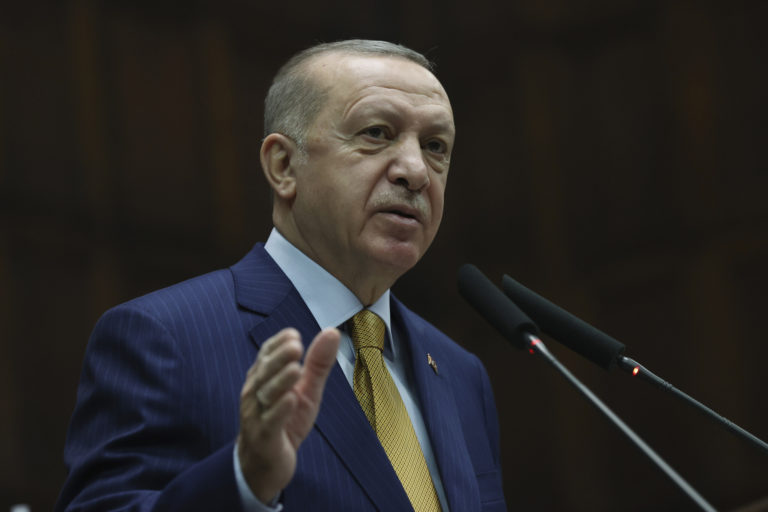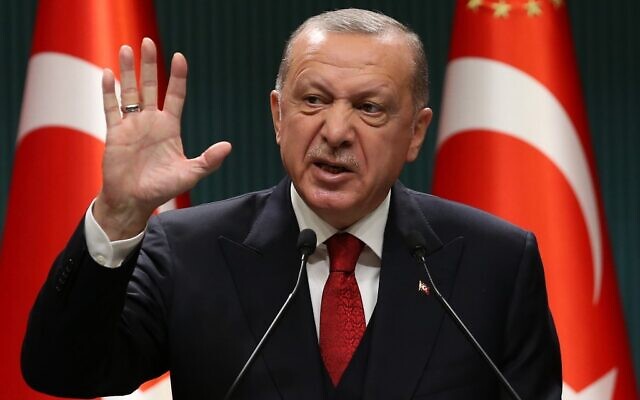
Amid multiple reports of covert overtures between nations, some analysts see Ankara as seeking to start off relations with new, less friendly US administration on the right foot.
Turkish President Recep Tayyip Erdogan said he wished to improve ties with Israel, after long years of making repeated bellicose comments toward the Jewish state.
“Our relations with Israel on intelligence have not ceased anyway, they are still continuing,” Erdogan said during a press conference. “We have some difficulties with
the people at the top.”
He stressed that Ankara “cannot accept the attitude of Israel towards the Palestinian lands,” and that “we differ from Israel in terms of our understanding of both justice and
the territorial integrity of countries.”
Turkey, once a strong Muslim ally of Israel, has become a geopolitical foe under Erdogan. The Turkish leader, an ardent defender of the Palestinian cause and a fierce critic of Israel, has often engaged in diatribes against Israel, including most recently in September during an address to the United Nations General Assembly.
Still, Ankara has continued to maintain open ties with the Jewish state, including on tourism and trade.

Erdogan’s comments come after a recent report on al-Monitor said Turkey had picked a new ambassador to Israel to fill the diplomatic post left vacant for over two years.
Some analysts have commented that with the coming change in US administrations and the arrival of Joe Biden, a president expected to be far less friendly to Erdogan than outgoing Donald Trump, Ankara is hoping to curry favor with Washington through gestures toward Israel.
Axios reported Thursday that Azerbaijan is attempting to mediate between the countries to improve relations. The report said aides to Azeri President Ilham Aliyev told Israeli officials Erdogan was in favor of improving ties.
The aides claimed that Erdogan was not anti-Israel, but had merely been under the “influence of advisers” who no longer hold sway.
Days ago a foreign policy adviser to Erdogan, Mesut Casin, told Voice of America: “If Israel comes one step, Turkey maybe can come two steps…If we see a green light, Turkey will open the embassy again and return our ambassador. Maybe in March, we can restore full diplomatic relations again. Why not.”

He added: “Establishing peace and security is very important to Israel and Turkey.”
An analyst on Turkish-Israeli relations told VOA Ankara’s sudden change in stance may be a result of the coming change in US administrations.
“Turkish-American relations are expected to enter a tough period, at least in the short run, considering the Biden administration’s sensitivity toward issues of democracy and human rights,” Selin Nasi said. “Given the present anti-Turkish sentiment prevalent in the US Congress, Turkey might be hoping that Israel can neutralize the opposition and help Turkey win Washington’s ear again.”
Al-Monitor reported in late November that Turkey had recently opened a covert channel with Jerusalem in an effort to mend ties. It said Hakan Fidan, the head of Turkey’s National Intelligence Organization, had held a number of meetings with top Israeli defense officials, including the head of Mossad Yossi Cohen.
Erdogan’s comments also come amid burgeoning ties between Israel and Arab nations, with Jerusalem recently agreeing to establish full relations with the United Arab Emirates, Bahrain, Sudan and Morocco. Erdogan has condemned those normalization deals.
Israel and Turkey formally ended a six-year diplomatic rift in 2016. The spat began in 2010 when 10 Turkish activists were killed in a violent confrontation with Israeli naval commandos aboard the Mavi Marmara ship that aimed to break Israel’s naval blockade of the Gaza Strip. Israel said the soldiers were violently attacked by the Turkish activists on board.
Then in May 2018, after violent protests on the Gaza border in which over 60 Palestinians, most of them members of Hamas and other terror groups, were killed, Erdogan placed the blame for the deaths squarely on Israel, calling it a “terrorist state” that commits “genocide.”
Turkey then recalled its ambassador and expelled Israel’s ambassador, Eitan Na’eh, and consul in Istanbul.
(Times of Israel).